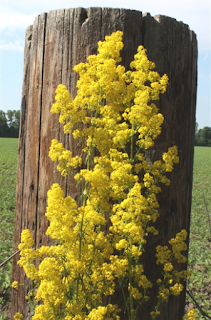 |
| Looking at the arrangement of leaves, it should come as no surprise that Lady's Bedstraw is a close relative of cleavers |
I was surprised at the dearth of mention of "cheese" in the Bible, Monte Python notwithstanding.
It seemed like a natural food for a society that straddled fixed-agrarian and pastoral lifestyles. Milk can be squeezed out of any mammal: Sheep, goats, cows, horses, jennys, camels and so on.
A little bit of thought shows that making hard cheese suitable for aging requires "rennet" and enzyme that curdles the milk so the whey can be drained off.
Rennet is typically made by soaking a bit of calf's stomach in water to extract those enzymes. And there is the rub. Cooking the calf in the mother's milk is specifically forbidden three times in the Old Testament, twice in Exodus and once in Deuteronomy.
The fact that it is mentioned twice in Exodus may have been related to the forced, nomadic lifestyle in the desert. Attrition was high for both man-and-beast since there were no secure walls or barns. The wanton slaughter of young animals to produce a delicacy in those circumstances could lead to a death-spiral in animal numbers and the resultant starvation of the nomads.
Or it could be that God did not want the twelve tribes to settle down. Aged cheese is heavy and would cause the tribes to become anchored to a give place. It was God's plan that two generations should pass and nearly every adult who left Egypt had died, leaving a pilgrim nation with loyalties only to God.
Christians look to Mark Chapter 15 where Jesus says that man is defiled by what comes out of him rather than what goes in. (Editor's note: If you marinade in sewage then you will stink, so sometime what comes out is determined by what went in)
Even if Christians reject Old Testament dietary rules, it is still wise to remember that it is also a proverb about handling people and is a warning to not add gratuitous insult to necessary injury. Sometimes it is necessary to fire workers. Sometimes we have to tell people "NO". It is not necessary to trample their dignity more than telling them no.
Back to Lady's Bedstraw (Galium verum)
 |
| Photo credit RW Smith |
Lady's Bedstraw is a source of rennet that does not involve meat or calves.
It is slower acting than animal rennet but it still functions. As a vigorous plant, it scales better than calves. For example: Suppose you have one cow and it throws a heifer calf. That is a dilemma. Do you slaughter it to collect its stomach to make cheese or do you keep it and forego a season of cheese making.
It is called "Bedstraw" because is smells nice and was used to stuff mattresses. It smells nice because of the coumadin in the leaves and stems and was said to repel fleas. In a pinch, that coumadin could be extracted and converted to rat poison. That is not a small consideration should things get hinky.
As a final bonus, the roots make a pink/red dye and the flowers can be used to make a yellow dye.
All in all, Lady's Bedstraw plays a couple of hard-to-fill niches very well and merit inclusion in your poop-hits-the-propeller herb garden.
Seeds can be purchased from THIS SOURCE or from eBay or etsy. Lady's Bedstraw prefers very well drained soils.
Along with Liberals, cleavers is the scourge of man.
ReplyDeleteCleaver seeds are a source of caffien so unlike Libs they have at least one redeeming feature
DeleteThanks for the tip. Sounds like it would be an excellent addition to my food forest.
ReplyDelete